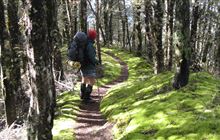Kaweka kiwi death raises concerns about dogs
Archived content: This media release was accurate on the date of publication.
Introduction
DOC and kiwi protection groups are urging dog owners to keep their animals under control after the death of a monitored kiwi in Hawke’s Bay’s Kaweka Forest Park.Date: 03 June 2021
The male North Island brown kiwi, named Mahika, was part of the Kaweka kiwi breeding programme. His body was discovered by a volunteer from the Environment, Conservation and Outdoor Education Trust (ECOED), who was following transmitter signals on a regular monitoring trip.
Mahika’s body was covered under a shallow layer of earth with an injury and the surrounding ground was covered in dog and human prints, suggesting he may have been attacked by a dog and the body deliberately hidden.
It is the second dog-related death of a monitored kiwi in the Kaweka in the past 12 months.
DOC Biodiversity Ranger Kahori Nakagawa says only permitted hunting dogs which have undergone kiwi aversion training are allowed in the Kaweka Forest Park, and owners are responsible for their dogs’ behaviour.
“It is devastating and so frustrating to lose any kiwi to a dog, as this kind of thing is entirely preventable.
“It’s even more disappointing someone would try to hide this death rather than taking responsibility for it. We are investigating, but we hope the person will do the right thing and come forward.
“The kiwi population is still recovering in the Kaweka thanks to many years of hard work by dedicated ECOED volunteers. Mahika was a young adult male who has just started to breed, so this is a blow to the population.”
DOC staff have noticed an increase in dogs in the park where the animals shouldn’t be. This was reflected in DOC’s Visitor Insights Report released in April.
Pet dogs are not allowed at all on public conservation land in Hawke’s Bay. In the Kaweka Forest Park, only permitted hunting dogs on active hunting trips are allowed. No dogs at all are allowed at scenic reserves, including Lake Opouahi and anywhere in Boundary Stream, such as the popular Bell Rock and Shine Falls tracks.
Kahori Nakagawa says people should check the rules if they are uncertain, and always need to be aware of where their dog is as kiwi become more widespread in the Kaweka.
Kiwi will run when chased, but their anatomy – especially their chests, which are weak due to a lack of flight muscles – means they can suffer fatal injuries very easily. An inquisitive dog can push a kiwi against a tree within a few moments of inattention by a dog owner.
“Kiwi aversion training is essential, but it’s also not a silver bullet.
“We know even the most obedient dogs can be drawn to the scent of a kiwi when their owner is distracted. Even kiwi aversion trained dogs may not be able to resist chasing a kiwi when the bird runs away in front of them.
“Everyone wants to see kiwi thriving and, as we can clearly see with this case, no one wants to be responsible for their dog killing one.”
DOC has increased its staff presence in the park over the last few months to remind people of the rules, but ultimately individuals are responsible for their choices.
Dog owners may be issued an infringement fine of up to $800 or prosecuted if they take any dog into a no-access area, take unpermitted dogs into the Kaweka Forest Park, or breach the conditions of their permit.
Charges can also be filed under the Dog Control Act where there is evidence dogs have killed kiwi. The maximum penalty the court can hand down in these cases is a $20,000 fine or up to three years in jail, and an order for the dogs to be destroyed.
Anyone who sees roaming dogs on public conservation land is urged to report it to 0800 DOC HOT (0800 362 468).
Background information
Tips for dog owners:
- Always check the rules around dogs before taking them to public conservation land, as different areas may have different rules. The DOC website will give you information or you can check with the local office.
- Only hunting dogs with a current Kiwi Aversion Training certificate are permitted in the Kaweka Forest Park. They must be travelling with their owner on a hunting trip.
- Hunters must have hunting permit (free, and can be applied for on the DOC website) and carry copies of the permit and kiwi aversion certificate with you at all times (i.e. either paper copy or keep photos on your phone)
- Hunters are only permitted to take one dog with them on a hunting trip, unless they have applied for a special permit. If you wish to hunt with multiple dogs, please contact the Napier DOC office.
- Pet dogs are not allowed in the Kaweka Forest Park, even if they have been aversion trained. There are a range of other recreational areas around Hawke’s Bay where dogs are allowed.
Links
- Hunting permits
- Information about the Kaweka Forest Park
- Kiwi Aversion Training
- Napier City Council’s list of dog exercise areas
- Hastings District Council’s list of dog exercise areas
Contact
For media enquiries contact:
Email: media@doc.govt.nz

